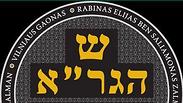
The Bank of Lithuania is planning to issue a new collectable €10 coin to commemorate the 300th anniversary of the birth of leading 18th century Jewish thinker the Vilna Gaon.
Born in 1720 as Elijah ben Solomon Zalman, the Vilna Gaon was a prominent Jewish adjudicator and the foremost leader of the Misnagdim, a countermovement to the Hasidic movement in eastern Europe. Through his commentary on the Talmud and other texts, he became one of the most familiar and influential figures in rabbinical study since the Middle Ages.
The coin is set to be released in the second quarter of 2020, and will be the continental currency's first mintage to feature an inscription in Hebrew.
The obverse of the coin bears the symbol of Lithuanian Jews (Litvaks) – a stylized menorah representing the community's identification as citizens since the 14th century reign of Gediminas, the Grand Duke of Lithuania.
Above it is the denomination (€10), below is the inscription LIETUVA (meaning 'Lithuania' in the local language), the year of issue (2020), the hallmark of the creative team and the mintmark of the Lithuanian Mint.
The coin is encircled with the inscription “The Year of the Vilna Gaon and the History of the Jews of Lithuania” in Lithuanian and Hebrew, as well as the number 5780 - the year in the Jewish calendar that corresponds to 2020.
The reverse of the coin bears two signs: the Hebrew crown-shaped letter Shin (ש) which in gematria (attributing a numerical value to letters) represents the number 300, to commemorate the 300th anniversary of his birth, and הגר"א – an acronym for “Ha Gaon Rabbi Elyahu”, meaning “Gaon (Genius) Rabbi Elijah”.
Pad-printing technology was used to highlight the abbreviation of his name and the letter Shin.
The bottom of the coin features a symbolic Torah scroll bookending the engraved number 300. The reverse also bears the inscriptions “the Vilna Gaon” and “Rabbi Elijah ben Solomon Zalman” in the Lithuanian and Hebrew languages.
The new doubloon will be released under the motto "Vil, nor Gaon" - a popular Yiddish phrase common among Litvak families since the times of the Vilna Gaon which roughly translates to “If you will it, you too can be a genius” and encourages children to achieve their goals.
Israeli Ambassador to Lithuania Yossi Avni-Levy praised the Lithuanian Mint's gesture.
"This is a very beautiful tribute on behalf of the Lithuanian government to the glorious Jewish heritage of Vilnius on the 300th anniversary of the Gaon's birth," said Avni-Levy.
But not everyone is content with this new commemorative initiative, as claims emerge that the hollowed-out menorah symbol on the coin's observe - representing the Lithuanian Jewry - has been appropriated by far-right and neo-Nazi groups in the Baltic state.
Vilnius-based Jewish author and educator Dovid Katz protested the mint's action on Defending History, a web journal combating Holocaust revisionism in Eastern Europe.
"Genuinely good intentions have apparently been undermined by taking bad advice from ultranationalist quarters and in some cases, their ever-enthusiastic agents and honorees," wrote Katz.
"When the symbol occurs in medieval forms and contexts, in interwar contexts, and today on official government agency emblems, it is benign and legitimate. The point is that in recent years and decades it has been weaponized as a symbol beloved of the antisemitic far-right."


















